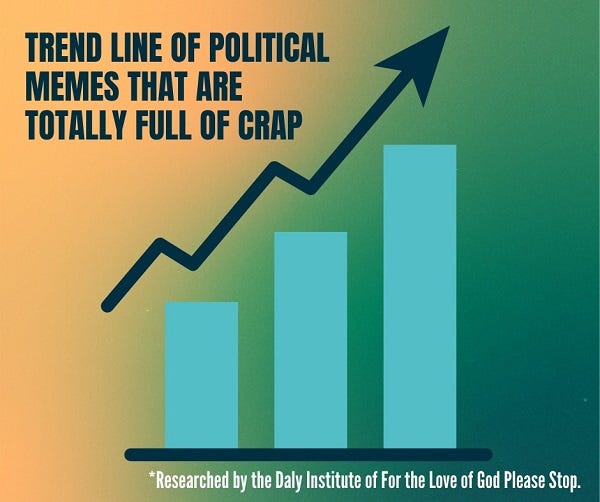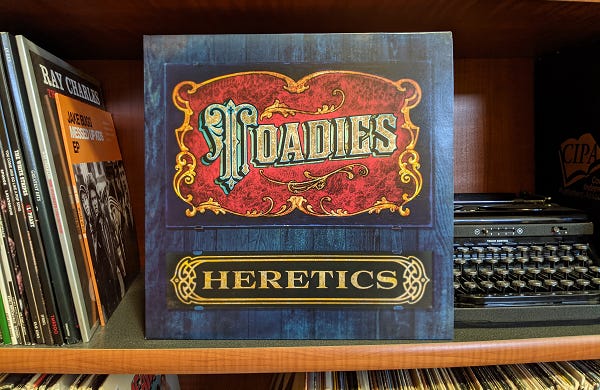The Modern Day Cone of Silence
The more serious the topic, the less intelligible the discourse.
One my favorite childhood television shows was the great spy-comedy, Get Smart, co-created by the legendary Mel Brooks. It starred Don Adams and Barbara Feldon, and I thought it was absolutely hilarious. I’ve probably seen every episode at least twice.
To clarify something right off the bat, I’m not quite as old as that previous paragraph might suggest. Get Smart was pulled off the air two years before I was born. What I grew up on were repeats in syndication a few years later, thanks to KWGN-TV in Denver.
Anyway, the show was a hoot, parodying far more serious spy drama and action offerings like James Bond. Adams (perhaps more recognized by my fellow Gen-Xers as the voice of Inspector Gadget) played a Maxwell Smart, a secret agent who worked for the U.S. government intelligence agency, CONTROL. CONTROL’s arch nemesis was an international criminal organization named KAOS.
CONTROL vs KAOS. Get it?
There were lots of recurring gags throughout the series’ five-year run, often having to do with secret gadgets and other slick devices used by agents. The most memorable was probably Maxwell Smart’s shoe-phone, the often inconvenient management of which was always good for a laugh. But my favorite was the “Cone of Silence”, a large apparatus, mounted above of the office of the head of CONTROL (played by Edward Platt).
The Cone of Silence was designed for secret, super-sensitive conversations between two people, physically encasing them in a clear plexiglass-looking dome to prevent eavesdroppers or wire-taps from listening in. The gag was that the contraption never actually worked. All it did was make it extremely difficult for the participants to hear each other, while people on the other side of the dome could hear them both just fine.
Here’s an example:
The comedic brilliance of the Cone of Silence came from its deep irony. The sophisticated, presumably very expensive technology had been designed purely to facilitate direly important communication between two individuals. Yet, neither person in the conversation could digest or even make out what the other was saying, ultimately forcing them to shout over each other (to no avail).
Today, I see a very similar irony in the realm of modern communication, which brings me to the real topic of this week’s newsletter: the Internet — more specifically discussion forums including social media.
Like a lot people, I spend more time than I should on social media. What started out many years ago as a sole, laid back, personal Facebook account for cracking jokes and reliving some memories with old friends from my “glory days,” has expanded to include public accounts on Twitter, Instagram, YouTube, TikTok, Disqus, and even some pretty obscure platforms I’ve mostly forgotten about (all highly transportable and super-accessible via my smartphone).
In my defense, a lot of it ties back to my writing, the sharing of it, and other occupational ventures. I haven’t talked about this much in my newsletter (or really anywhere), but in addition to my novels and columns (for which social media has become an important promotional tool), I also do a good amount of contract work for multiple businesses that rely on significant social-media presences.
In other words, I’m pretty wrapped up in this world. And a big part of that culture is Internet discourse. What always gets me is that — like the Cone of Silence — the more important and consequential a topic is (whether its politics, religion, science, health, etc.), the less intelligible the discourse surrounding it tends to be.
Again, the key word here is irony. The Internet has made it easier than ever for people all over the world to communicate with each other. Yet that dialogue is often reduced to individuals not hearing what each other is saying, and inevitably just shouting over each other.
The world of politics is where the non-flinching digital rancor is seemingly at its loudest and angriest, with our country’s political tribes coming at each other 24/7 with an endless online barrage of talking points, bad-faith accusations, misinformation, and whataboutism. And of course, there are those delightful political Internet memes, which often incorporate all of the above (just in a more visually stimulating package).
As Kevin Williamson writes in his book, The Smallest Minority, “We think in language. We signal in memes. Language is the instrument of discourse. Memes are the instrument of antidiscourse, i.e., communication designed and deployed to prevent the exchange of information and perspectives rather than to enable it…”
Like Williamson, who’s a fellow (and extremely gifted) political writer, I hate political memes. They drive me so nuts that I occasionally create and post counter-memes on social media to convey just how much I hate them:
The reason this topic is particularly sensitive to people like me — and Williamson for that matter — is that we spend a lot of time trying to persuade people in our writing that the fact-based, often well-researched views we put forth have validity, and are worthy of readers’ consideration when evaluating a given topic or issue. Memes, however, usually serve the exact opposite purpose, bearing little or no interest in accuracy or persuasion, but rather belittling, offending, or “triggering” someone on the perceived “other side.”
Thoughtful, persuasive discourse can speak effectively to open minds. Memes typically just cater to (and even create) closed ones.
And when minds are closed, so are ears… as was the case with the Cone of Silence.
I just wish today’s political culture was as easy to laugh at.
I realize that this week’s piece may have come across as a bit of a vent session, and truth be told, it kind of was. But honestly, as those who’ve read any of my books already know, I also enjoy writing about old television shows I loved as a child. And Get Smart is one I had yet to.
I’ll leave you with my all-time favorite scene from that series (I absolutely lost it the first time I watched the revolving door part):
Want to talk about Get Smart, social media, memes, or whatever else? Drop me an email, or leave a comment section below.
Have you ordered your copy of RESTITUTION?
My new book “Restitution: A Sean Coleman Thriller” is out now! You can get it on Amazon, Apple, Barnes & Noble, Kobo, Books-A-Million, and wherever else books are sold.
Interested in a signed copy? You can order one (or five) here.
Random Thought

Obligatory Dog Shot
Thirsty dream.
Featured Vinyl
This week’s featured vinyl was inspired by the Hootiefest event in Cancun I wrote about a couple weeks back. As I mentioned at the time, one of my favorite bands, the Toadies, was long scheduled to perform. But earlier that week, it was announced that only front-man Vaden Todd Lewis would be making the trip (for a solo, acoustic set).
Whatever the reason for it (I’m guessing something Covid related), I wasn’t too broken up about the change. As big as a rock fan as I am, I also love stripped-down acoustic takes on rock songs. In fact, I was trying to work a trip to Texas last year, primarily to see a rare solo performance by Lewis, but it didn’t happen. So, in a way, I got my wish at Hootiefest, and Lewis did not disappoint. Also, I’ll be seeing the full band later this year, quite a bit closer to home.
The Toadies 2015 “Heretics” album is likewise unique in that it features a lot of alternate, deconstructed takes on some of the band’s most popular and memorable songs, along with a few covers. What’s particularly cool is that the vinyl version includes three bonus tracks, including “The Appeal” and a live show favorite, “I Come from the Water.”
Just a fun album from beginning to end.
That’s all for now. Thanks for reading today’s Daly Grind.
Want to drop me a line? You can email me at johndalybooks@hotmail.com, and also follow me on Facebook, Twitter, and Instagram. If you haven’t subscribed to this newsletter yet, please click on the “Subscribe now” button below. Doing so will get these posts emailed directly to you.
Also, if you’re not caught up on my Sean Coleman Thrillers, you can pick the entire series up at a great price on Amazon. And if you’re interested in signed, personalized copies of my books, you can order them directly from my website.
Take care. And I’ll talk to you soon!










"Daly Institute For the Love of God Stop"???? LMAO. awesome. do you need volunteers?
I agree about seeing stipped down rock done on acoustic instruments. I had two bands at one point. One played electric, one acoustic. I actually made more money with the acoustic one.
When Springsteen returned to NJ from California, he performed some acoustic shows for Friends and Family at pizza joints, movie theaters etc. I was invited to one of the shows in Asbury Park. It was a revelation. He played "Born in the USA" as a Muddy Waters like delta blues. It was a dirge not a celebration of Reagan's policies. Get Smart was my favorite show when it came out. That and F Troop. My teachers used to say that I was a "smartass". It didn't have the social acceptance that it has now. Get Smart and Mel Brooks let me know that I was not alone. Speaking of which, sad about PJ O'Rourke, to my mind the funniest conservative around.